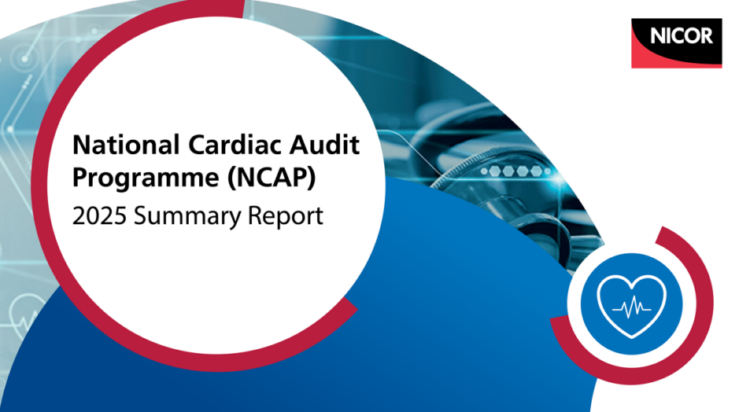NICOR publishes 2025 Annual Report

Home » News and events »
The landscape for cardiovascular disease is changing. There is evidence of good practice, but the challenges and pressures continue to be seen across the NHS, including cardiovascular services. In some areas, the data shows waiting lists for cardiovascular elective treatment is getting worse, patients are experiencing longer delays for urgent admissions, and there is significant inequalities and variances in care across the country.
NICOR has today (13 March 2025) published its National Cardiac Audit Programme (NCAP) 2025 Annual Report supported with 10 interactive sub-specialty clinical reports, providing more detailed domain-level analyses and commentary allowing people to focus on the information that is of most interest to them (for example drilling down to explore the performance of different parts of the country and individual hospitals), and a dedicated Annual Report for Patients, Carers and the Public, covering the 12 months from 1 April 2023 to 31 March 2024.
The reports look at the performance of cardiovascular services, shows the positives but illustrates where there are opportunities for improvements. The aim is to raise awareness of the current picture of cardiovascular services across the country and to monitor performance across hospitals and healthcare improvement bodies. Where good practice standards are being met, hospital teams should be applauded but where standards are not met, hospitals should implement a quality improvement programme. These efforts should drive sustainable improvements in patient wellbeing, safety and outcomes.
The COVID-19 pandemic had a significant impact on local health services and hospitals. This included increased waiting times for elective treatment (non-urgent and planned) and delayed admissions for urgent cases. Five years on since the start of the pandemic, some of these effects are being reversed, though the health and social care system continues to experience ongoing challenges to restore service capacity and improve delays to treatment. The reasons are complex but include staff retention and recruitment. This adds further strain to an already overworked NHS, which is struggling to cope with growing demands from a larger and older population.
Of particular concern are the substantial inequalities and variances in care across the country. More work is needed to understand these and to determine which variations are unwarranted and how things can be done to ensure universal and equal access to treatment for everyone.
Despite the many challenges and in what remains a turbulent time for the NHS, progress is being made on the overall quality of care in many areas of cardiology care, with hospitals achieving excellent results for many specific national quality standards. This includes:
- very low mortality and complication rates for cardiac surgery in both adults and children with congenital heart disease
- more heart attack patients being managed on a cardiac ward and most being seen by a specialist team, receiving appropriate care and having referrals to cardiac rehabilitation on discharge
- an increase in the number of higher-risk (STEMI) heart attack patients being prescribed the newer P2Y12 antiplatelet drugs
- most hospitalised heart failure patients being seen by a specialist team and many receiving appropriate care
- increased use of intracoronary imaging to detect type of disease and results of treatment in percutaneous coronary intervention (PCI) cases for left main coronary lesions and for complex PCI cases
- the majority of TAVI procedures being performed under conscious sedation using the percutaneous transfemoral approach (the catheter is inserted into the femoral artery), resulting in fewer complications and low in-hospital and 30-day mortality rates
- low re-intervention rates because of complications in the first year after a cardiac rhythm management device implant.
The Government has announced that it will publish a new 10 Year Plan in Spring 2025 to “transform the NHS” and you can help. Members of the public are being asked to help shape this plan and share their experiences and views on what change is needed. Take this opportunity to ensure heart health and cardiovascular services receive the attention they deserve. You can comment on the Change NHS portal and share your views at Change NHS.
We would welcome your comments, feedback, queries, or ideas for our future reports at nicor.auditenquiries@nhs.net
Note to stakeholders and media:
Maintaining clinical care for patients is always a top priority of the cardiovascular community. Alongside this, great efforts have been made during the pandemic to maintain a flow of audit data to NICOR’s National Cardiac Audit Programme.
The NCAP analyses combined with inputs from our clinical colleagues, patients, and carers, have allowed us to summarise experiences during that time as well as highlighting lessons to be learned for service recovery and quality improvement.
Understanding the continued pressures on hospitals and their clinical teams, a big thank you to all our colleagues and stakeholders for their continued support and contribution. Particularly our clinical colleagues, their supporting audit and clerical teams, and their hospital management teams for ensuring that important data are collected and sent to NICOR. We hope our annual reports put these data into context. In addition to the annual reports, we are incredibly pleased to see an increasing uptake in the use of our new data reporting tools across the country. These allow clinical teams to determine how they are performing on a continuous basis and provide a feedback system to help audit teams improve data quality.
National Institute of Cardiovascular Outcomes Research (NICOR)
NICOR is a partnership of clinicians, IT experts, statisticians, academics and managers who, together, are responsible for the National Cardiac Audit Programme (NCAP) including a number of new health technology registries, such as the UK TAVI registry. Hosted by NHS Arden and Greater East Midlands CSU, NICOR collects, analyses and interprets vital cardiovascular data into relevant and meaningful information to promote sustainable improvements in patient well-being, safety and outcomes. It is commissioned by NHS England and GIG Cymru /NHS Wales. Visit NICOR’s website for more information.
For any media enquiries, contact Senior Communications and Engagement Manager Sarah Colston via email sarah.colston@nhs.net.
